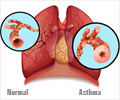Temporary quadrupling of the dose of inhaled glucocorticoids when asthma control started to deteriorate, would reduce the incidence of severe asthma exacerbations among adults and adolescents with asthma.

‘In this trial involving adults and adolescents with asthma, a personalized self-management plan that included a temporary quadrupling of the dose of inhaled glucocorticoids results in fewer severe asthma exacerbations than a plan in which the dose was not increased.’





Asthma is one of the most common chronic diseases and affects around 300 million people worldwide. Acute episodes are frightening for patients, cause significant ill health, unnecessary deaths and also account for a large proportion of the overall costs of asthma to health services. During serious asthma attacks patients may have to be admitted to hospital for treatment including oxygen, nebulized bronchodilators and high dose steroids that can sometimes have adverse side effects.
Three people die from asthma in the UK every day and, according to the National Review of Asthma Deaths, two-thirds of these deaths could have been prevented with basic asthma care, which includes patients getting a written asthma action plan from their doctor which, among other advice, outlines the medicine they should use.
The Fourfold Asthma Study (FAST) - published in the New England Journal of Medicine compared two asthma self-management plans in a large trial involving nearly 2000 patient volunteers in England and Scotland. Around half the patients were randomly assigned to the plan that prescribed a quadrupling of inhaled steroid during periods of worsening asthma and the other half followed the current standard self-care plan over a period of 12 months.
The study showed that the participants in the quadrupling group had a 20% reduction in severe asthma attacks compared with the usual care group and they also had fewer asthma-related hospital admissions as only 3 patients in the quadrupling group were admitted to hospital compared with 18 in the usual care group.
Advertisement
Long-term asthma patient, Richard Harris, 68, from Stamford, Lincs, who took part in the trial, said: "The study has made a real difference to my quality of life and my asthma is under much better control as a result. At the completion of the study I continued to follow the quadrupling self-management plan with the agreement of my GP. I could not praise the team at Nottingham highly enough. They manage to combine high levels of professionalism with a friendly approach that makes the patient feel part of the team, with valued opinions and information."
Advertisement
"We'd urge any healthcare professionals who want to increase their patient's asthma medication to fully explain what it means, let them know about potential side effects and include it in their written asthma action plan. People with asthma who would like to increase their medication should talk to their healthcare professional and should not delay getting help or support even if they do have an asthma attack."
The FAST trial was managed by the Nottingham Clinical Trials Unit and funded by National Institute for Health Research (NIHR). Professor Hywel Williams, Director of the NIHR's Health Technology Assessment (HTA) Program, said: "We are proud to have funded this original researcher-led study. The research shows that quadrupling inhaled steroids during periods of worsening asthma reduces severe asthma attacks by a substantial amount, resulting in less need for oral steroids and fewer hospital admissions. The study is good news for asthma sufferers all over the world as it shows how patients can better manage their condition and ultimately improve their quality of life."
Source-Eurekalert















